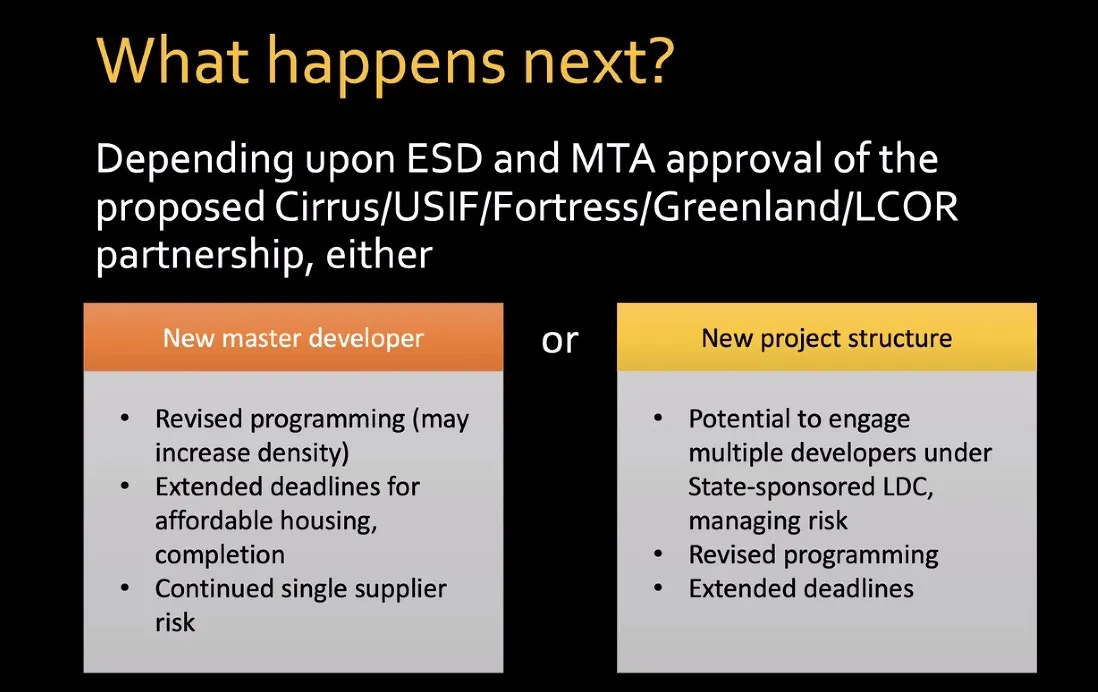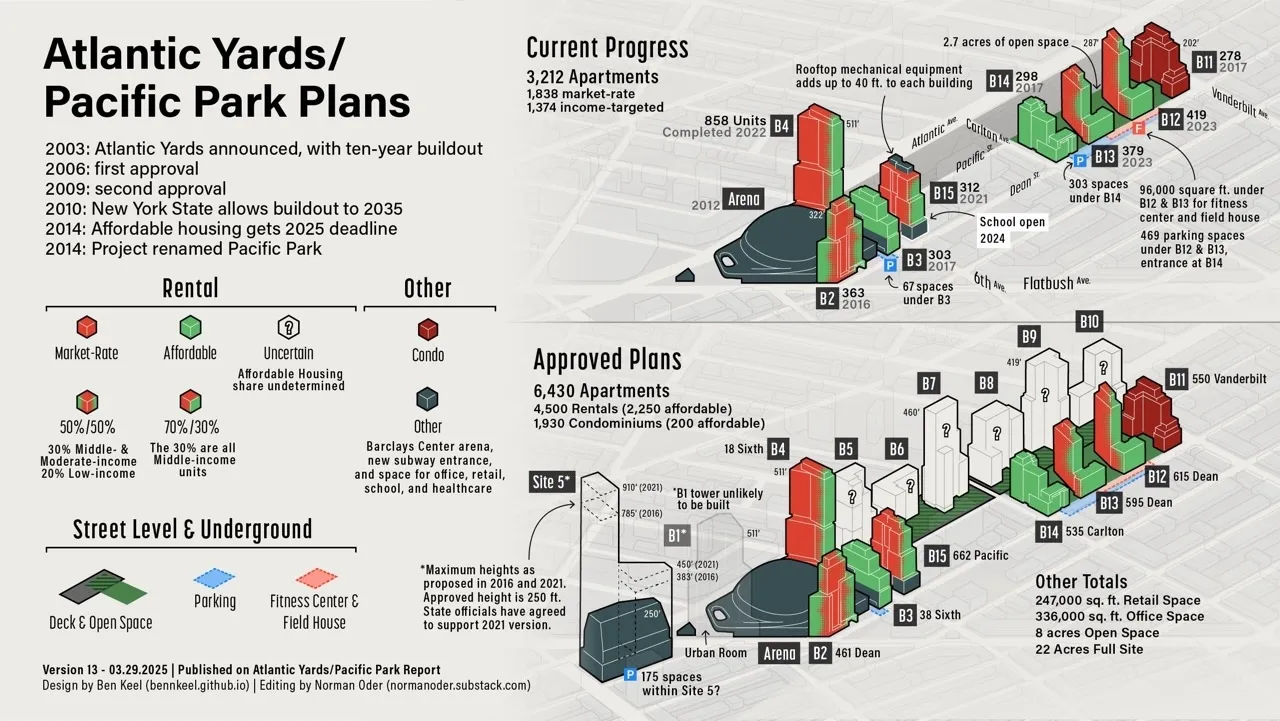Some questions for today's BrooklynSpeaks press conference on the missed affordable housing deadline
Today at 4 pm, as I wrote (link), the coalition BrooklynSpeaks will hold a press event/rally with state Assemblymembers Bobby Carroll and Jo Anne Simon, City Council Members Crystal Hudson and Shahana Hanif, and various community leaders "to call on Governor Hochul to bring accountability to the long-delayed Atlantic Yards project."
With 1,374 completed, that leaves 876 to go, so $1.752 million/month, which ESD has refrained from pursuing, saying that, with a new development team on the horizon, it wants "an updated schedule of deliverable target deadlines for the development team while retaining all rights to issue liquidated damages."
Note: ESD counts 1,374 units completed, including a super's unit, while BrooklynSpeaks counts 1,373 and thus $1.754 million/month due. It has set up a tracker that, presumably, will be updated each month.
What can BrooklynSpeaks and elected officials do to encourage or ensure that the penalties are levied?
At a presentation last week, Gib Veconi, a leader of BrooklynSpeaks said that the obligation to collect liquidated damages can’t be changed without consent from the parties to the 2014 settlement.
How could that be achieved? Would it be an executive action by ESD?
I can't be there, though I am sending a videographer. So I wanted to float some questions for the leaders of BrooklynSpeaks and the elected officials who, I suspect, largely take their cue from them.
In 2014, averting a threatened lawsuit, BrooklynSpeaks reached a settlement with New York State that set a new May 31, 2025 deadline for the project's 2,250 affordable units, with $2,000/month liquidated damages for each missing unit, with the money directed to a city trust fund for affordable housing.
In 2014, averting a threatened lawsuit, BrooklynSpeaks reached a settlement with New York State that set a new May 31, 2025 deadline for the project's 2,250 affordable units, with $2,000/month liquidated damages for each missing unit, with the money directed to a city trust fund for affordable housing.
With 1,374 completed, that leaves 876 to go, so $1.752 million/month, which ESD has refrained from pursuing, saying that, with a new development team on the horizon, it wants "an updated schedule of deliverable target deadlines for the development team while retaining all rights to issue liquidated damages."
 |
| Screenshot: BrooklynSpeaks |
Note: ESD counts 1,374 units completed, including a super's unit, while BrooklynSpeaks counts 1,373 and thus $1.754 million/month due. It has set up a tracker that, presumably, will be updated each month.
Questions about the penalties
How did they come up with the idea of $2,000/month liquidated damages for each missing unit? Why not more, or less? Was it keyed to the notion, at least at the time, of rent for an "affordable" unit?
What can BrooklynSpeaks and elected officials do to encourage or ensure that the penalties are levied?
At a presentation last week, Gib Veconi, a leader of BrooklynSpeaks said that the obligation to collect liquidated damages can’t be changed without consent from the parties to the 2014 settlement.
I don’t read it that way, so I'd like to see what language is cited.
I do think the parties—civic groups in the BrooklynSpeaks coalition and four potential individual plaintiffs—could go to court to enforce the obligation.
Is that on the table? Does BrooklynSpeaks have any budget for that, for example the $35,000 left over from a judge's 2013 decision to award attorney's fees?
Who should pay the penalties--Greenland USA, the developer that is losing six railyard development sites in foreclosure, but retains the Site 5 and B1 parcels?
Questions about trust
In 2014, Michelle de la Uz of the Fifth Avenue Committee, a key negotiator of the settlement, said it "would take time and measurable and repeated actions on the part of the developer and the state" to restore trust.
Today, how and why should anyone trust a future renegotiation? What would be required to restore trust? An upfront payment into a trust fund? A bond to ensure obligations?
The developer's affordable housing partner is the Mutual Housing Association of New York, or MHANY, a successor to New York ACORN.
Has BrooklynSpeaks consulted with MHANY, or otherwise gotten its input, regarding the current delays and potential resolution?
Have any mayoral candidates consulted with BrooklynSpeaks or otherwise been receptive to input?
Questions about a resolution
A new joint venture, involving Cirrus Real Estate Partners, LCOR, and others is negotiating with ESD to take over the project.
Based on an unsuccessful effort by Greenland in 2023, the developer likely will seek additional bulk and extended timelines, while promising, albeit with delays, a larger number of affordable housing units. It also might ask for additional city or state subsidies to deliver deeper affordability.
How should that be evaluated? Can/should third-party experts--beyond the consultants hired by ESD--advise the public on the environmental impacts of the proposed project, its financial aspects, and its public benefits?
BrooklynSpeaks favors a new project structure, under a state-sponsored local development corporation, which might better manage risk.
 |
| From PHNDC presentation by Gib Veconi |
Would it require ESD to reject the proposed new partnership? If so, what happens to the existing ownership rights in aspects of the project?

Comments
Post a Comment